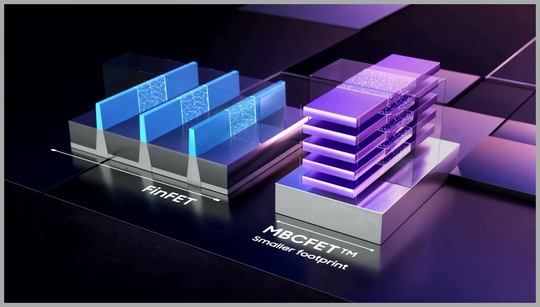Samsung has recently disclosed its updated fabrication Technology roadmap at the annual Samsung Foundry Forum (SFF) 2023. The roadmap outlines the company's plans for upcoming nodes, such as the 2nm SF2 (2nm-class) and 1.4nm SF1.4. In addition, Samsung intends to introduce a cutting-edge 5nm-class radio frequency manufacturing process and venture into GaN chip production in the near future, as part of its commitment to technological advancements and diversification across various sectors.
Samsung's 2nm Node: SF2
Samsung's 2nm node will succeed the SF3, its 3nm node introduced in 2022. The SF2 (2nm-class) fabrication process, set to debut in 2025, aims to deliver higher power efficiency, improved performance, and reduced area compared to SF3. Mobile SoC production is slated to transition to the 2nm node in 2025, followed by the HPC-enhanced SF2P in 2026.
To complement the SF2, Samsung plans to offer a range of high-quality SF2 IPs, including LPDDR5x, HBM3P, PCIe Gen6, and 112G SerDes. Moreover, specialized fabrication processes such as SF2A for automotive applications in 2027 and 5nm Radio Frequency (RF) in 2025 will also be available.
The 5nm RF process holds significant potential, projected to enhance power efficiency by 40% and increase transistor density by approximately 50% compared to the current 14nm RF process.
GaN Chips and Expanded Manufacturing Capacities
In 2025, Samsung plans to commence manufacturing GaN power semiconductors. These chips will cater to a wide range of applications, including consumer electronics, data centers, and the automobile industry.
The company also aims to strengthen its manufacturing capabilities in the United States and South Korea. High-volume chip production at the Pyeongtaek line 3 (P3) is scheduled to commence in the second half of 2023. Furthermore, the Taylor fab in Texas is expected to complete construction by the end of this year, with operations commencing in the second half of 2024.
Additionally, Samsung plans to expand its total clean room capacity by 7.3 times by 2027. The following chart illustrates Samsung's upcoming fabrication processes and their respective release dates:
With this updated roadmap, Samsung solidifies its position as a leader in chip fabrication technology. By offering solutions that enhance power efficiency, improve performance, and provide specialized processes for different applications, Samsung demonstrates its commitment to meeting the growing demand for advanced chips. Through investments in manufacturing capacities and clean room expansion, the company is poised to address the evolving needs of the industry.
For more information on Samsung's latest developments, visit our SFF 2023 hub, where you can find the most recent updates from the event.














